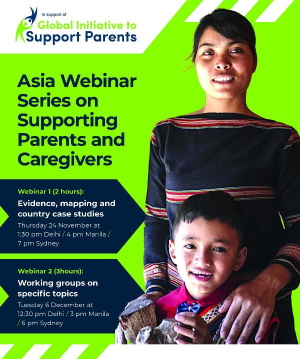| Event | Asia webinar series on supporting parents and caregivers — Webinar 2: Working groups on specific topics |
| Date | December 6, 2022 |
| Time | 3.00 PM in Singapore |
| Language | English |
Description
 DOWNLOAD AGENDA
DOWNLOAD AGENDA
Globally, many children and adolescents may not reach their developmental potential. Poverty, undernutrition, childhood illness, child maltreatment, parental mental illness and substance use, exposure to violence, conflict and other early childhood adversities are among the risk factors affecting children’s ability to reach their developmental potential.
Rigorous evidence has demonstrated that parenting has a lifelong impact on children’s healthy growth and the development of human capital. Evidence-based parenting interventions support healthy growth and development, can prevent child maltreatment, and improve mental health of children, adolescents, and parents. However, access to such interventions remains inadequate.
In response to the challenges in caregiving practices posed to families, which have been exacerbated by the COVID-19 pandemic, a coalition of partners, including WHO, UNICEF, Parenting for Lifelong Health, the Early Childhood Development Action Network, and the Global Partnership to End Violence Against Children, launched the Global Initiative to Support Parents (GISP) in May 2021.
The ultimate vision of the GISP is to support country-led efforts, so that every family is supported in so that every family is supported in their caregiving practices and receives the support that they need to develop resilience and protect well-being.
ARNEC, together with GISP, is hosting this second webinar in the series.
The objectives are to convene participants from the 48 countries in the Asia-Pacific region, to:
- Present the rationale for parenting support as a key approach to improve the wellbeing of children
- Develop a common understanding of evidence-based interventions and delivery models
- Examine regional work in progress and gaps in interventions
- Examine the role of different sectors, namely, health, education and child protection
- Promote learning and sharing among countries to enhance support for parents and caregivers
- Increase visibility on the need to act and generate widespread commitment for action and
- Identify potential next steps countries can take to strengthen parenting/caregiver support
This second webinar consists of plenary presentations on regional tools and resources on parenting and six working group discussions on the following topics:
- Parenting children with disabilities (incl. caregiver wellbeing)
- Parenting interventions to prevent violence
- Parenting of adolescents
- Digital solutions for parenting
- Men’s engagement in parenting
- Parenting in humanitarian settings




